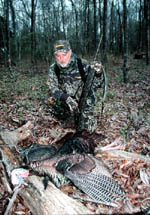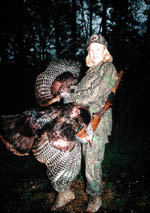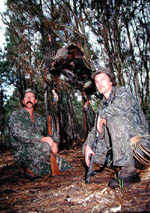
|
Features
|
|
|
|
Books
|
|
|
|
Fun & Games
|
|
|
|
Contact Us
|
|
|
John's Journal... Entry 192, Day 5
TIPS FROM DIXIE'S TOP TURKEY HUNTERS
Jim Crumley and Preston Pittman
 EDITOR'S
NOTE: If you hunt turkeys in the South, you have
to deal with several subspecies of birds under different hunting conditions
and a wide variety of terrain. In ...
EDITOR'S
NOTE: If you hunt turkeys in the South, you have
to deal with several subspecies of birds under different hunting conditions
and a wide variety of terrain. In ...
* Florida, you'll hunt palmetto swamps and pastures,
* Virginia, you'll hunt the mountains and the valleys,
* Texas, you'll hunt arid desert lands,
* Mississippi and Louisiana, you'll hunt along flood plains,
* Alabama, you may hunt pine plantations,
* many sections of the country, you'll hunt crop lands and
* other regions you'll hunt in deep woods. To have success hunting turkeys
in the South, you must use many tactics and understand the differences
in the turkeys and the terrain you hunt. I've interviewed some of Dixie's
top turkey hunters to give you situations and strategies that will help
you take more toms this spring.
BAGGING BIG-WOODS GOBBLERS WITH JIM CRUMLEY, OF ROANOKE, VIRGINIA, THE CREATOR OF TREBARK CAMOUFLAGE:
 Question:
How do you handle a gobbler that gets in close in big woods but then hangs
up?
Question:
How do you handle a gobbler that gets in close in big woods but then hangs
up?
Jim Crumley: You also may have a problem if the tom's in close enough
to take a shot but is behind a bush or a tree and won't step out to let
you take the shot. To solve this problem, I continue to call to the gobbler
and give soft purrs, soft yelps and soft clucks. Many hunters may tell
you to shut up and make the turkey come hunting you. However, I've found
that oftentimes when you choose this tactic the gobbler will walk off
and leave you. What's even worse is if you don't see or hear him walk
off, you don't know where he's at, and you run the risk of spooking him.
I believe that by giving those soft, subtle feeding calls I'm imitating
a hen that's totally disinterested, which often causes the gobbler to
come in closer. Then he thinks the hen can see him better, realize what's
she's missing and be able to observe what a fine gobbler he is. Most anyone
can call in a lone bird in the big woods when the toms are screaming out
gobbles every breath. But where generally a hunter fails is in that last
60 or 70 yards. Subtle calls pay the most dividends when the hunter not
only gets a turkey in close enough to take but also has him in the right
position to take a shot."
UNDERSTAND FLORIDA TURKEYS WITH PRESTON PITTMAN OF PICKENS, MISSISSIPPI, OWNER OF PRESTON PITTMAN GAME CALLS:
 Question:
How is hunting Florida turkeys different from hunting other southern birds?
Question:
How is hunting Florida turkeys different from hunting other southern birds?
Preston Pittman: Most of the time when you're hunting an Osceola gobbler
you'll have to hunt them either in pastures or palmetto swamps. A palmetto
swamp in Florida is the exact opposite of a Mississippi or a Louisiana
swamp. In Mississippi or Louisiana, you can see 100 to 300 yards in a
swamp. But in Florida's palmetto swamps, you may not be able to see 10
yards in front of you. In river-bottom swamps, you can hear a turkey gobble
from 1/4- to 1/2-mile away. However, in the Florida swamps, you may not
be able to hear a turkey gobble 100 yards in front of you. That's why
often a turkey hunter who hunts Florida for the first time may try to
get too close to a gobbler before he starts calling to him. He may spook
the bird. So, if you're hunting a Florida gobbler, take a stand further
away from the bird then you will if you're hunting anywhere else. Another
problem with hunting the Florida gobbler is that these birds often won't
gobble much when they get to the ground. Because Florida homes plenty
of bobcats, and bobcats eat turkeys, the turkeys realize that the birds
that gobble a lot on the ground will get eaten at a young age. The turkeys
that are silent on the ground live and breed the most. A Florida gobbler
may not come to you like an eastern gobbler will. He may have to walk
around or fly over water, or he may attempt to dodge an area where he's
been harassed by bobcats. Patience is the number-one key required for
taking a Florida turkey. I don't call much when I'm hunting these birds
because I want them to come to me.
To learn more about John E. Phillips' turkey-hunting books, click here.
Check back each day this week for more about TIPS FROM DIXIE'S TOP TURKEY HUNTERS ...
Day 1 - Successful Turkey
Tactics with Eddie Salter
Day 2 - Cecil Carder and Allen Jenkins
Day 3 - Brad Harris, David Hale and Jim Clay
Day 4 - Ronnie Strickland
Day 5 - Jim Crumley and Preston Pittman